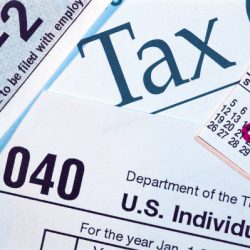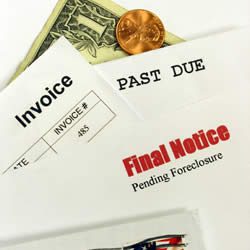Bank of America has announced that it is rolling out a test program in three states (including New York) in which the bank will accept a deed-in-lieu of foreclosure from homeowners in foreclosure and then rent the properties back to the homeowners for an unspecified period of time.
For those homeowners who have tried to modify, have been unable to do so, and remain too stubborn to file for bankruptcy, this may be an option - but it may come with strings attached.
First, BOA has not discussed anything about the tax consequences of the transaction. Even if a homeowner “surrenders” a property bank to a lender, the lender still has the right ...
Read More...
Tax Refunds and Chapter 7 Bankruptcy – Nothing Has Changed For Homeowners With Equity
In bankruptcy, you are allowed to protect various assets, such as cash or cash equivalent assets such as the right to receive a tax refund. This is called exempt property or exemptions.
When the exemption laws were overhauled in New York in January 2011, it proved to be a major benefit to homeowners and renters alike. Homeowners are now allowed to protect up to $150,000.00 in equity in their primary residence. Renters are now allowed to protect up to approximately $12,000.00 in any personal property, including tax refunds.
Despite the above benefits, there has always been, and still remains, a tradeoff for homeowners. If a homeowner ...
Read More...
New Means Test Housing Allowances Levels Playing Field for Long Island Renters
Most individuals or couples filing for protection under either Chapter 7 Bankruptcy or Chapter 13 Bankruptcy are required to meet certain income eligibility requirements under the “Means Test.”
Under the Means Test, you must first determine if your average monthly income for the last six months is below the median income for your state, based upon the size of your household.
If your average monthly income for the past six months is below the median income in New York, you have passed the first hurdle, and so long as you meet the other eligibility requirements, you can file for protection under Chapter 7 Bankruptcy.
If your average monthly ...
Read More...
It May Make Sense to Get Over It – Mr. Obama Is Not Going To Save Your Home…
Earlier today, I was listening to a business report on the radio in which an economist actually recommended that homeowners who purchased a home in the mid-2000's with little or no money down, who are now at least 12 months behind on their mortgage and have been unable to modify their mortgage because of insufficient income, actually file for Chapter 7 bankruptcy and GET IT OVER WITH - MR. OBAMA IS NOT GOING TO SAVE YOUR HOME!!!
Unfortunately, this mantra is going to going to get louder in the coming months as (a) banks may have already modified the vast majority of those who can truly afford to make timely mortgage payments, and (b) State ...
Read More...
Are Mortgage Lenders Encouraging Homeowners to File Bankruptcy?
I know this sounds completely bizarre, but it may start happening more frequently in the near future.
In the past 30 days, I have encountered three new clients who have been "informally" advised by their mortgage lenders to file bankruptcy to deal with their unsecured debt PRIOR to completing a mortgage modification.
Lenders, in addition to the 31% rule (previously discussed in another post), are now taking a closer look at a homeowner’s total debt ratio - also known in the banking business as the “back end number.”.
In the cases I have encountered thus far, each client had a total debt ratio (mortgage payments, auto payments and credit ...
Read More...
Eliminating Taxes: What Taxes are Dischargeable in Bankruptcy?
It is commonly misunderstood that bankruptcy cannot eliminate any tax liability. Although treatment of tax liability is one of the most complex aspects of consumer bankruptcy law, the Bankruptcy Code does offer many debtors substantial income tax relief. Whether or not your bankruptcy filing relieves your tax debt depends on several factors including the nature and the status of tax liability and the type of bankruptcy proceeding. Remember, only individuals can discharge certain tax debts, not businesses.
An individual can discharge debts for taxes in Chapter 7 bankruptcy only if all of the following conditions are true:
They are only ...
Read More...
Want to be Debt Free? Stop Procrastinating!
My topic of discussion this week is procrastination. In my last post, I discussed the ramifications of waiting too long to file bankruptcy. The same advice goes for anything to do with your finances. Even though there's a little procrastinator in all of us, there's a difference between putting off doing the laundry or washing the car and putting off paying your bills on time. While its understandable that you would want to put off something you don’t want to do, procrastinating with your finances till tomorrow will almost always hurt your credit score today. Luckily, you can live in the financial present and break the habit of ...
Read More...
Have You Waited Too Long to File Bankruptcy?
Most clients that come see me for a consultation tell me that they feel like bankruptcy is their last resort. However, this really isn’t true. Bankruptcy can protect your property from creditors. A last minute decision to file will limit your options and if you wait too long to file, you may lose property you otherwise could have saved.
Here are six signs you may have waited too long to see a bankruptcy attorney:
FORECLOSURE: After your home has been sold at foreclosure sale, it is too late to cure the arrearage and reinstate your mortgage in Chapter 13 bankruptcy.
REPOSESSION: If your car has been repossessed by the lender, it may be ...
Read More...
HOW TO: Stop Harassing Phone Calls from Debt Collectors
With economy hurting and unemployment reaching record levels, harassing phone calls from debt collectors have become a way of life for many Americans. My clients inform me that collection agency calls can be rude, threatening, and manipulative. For some, the calls are so bothersome that phone numbers have to be changed or disconnected to stop debt collection calls. Many consumers don’t realize that they are guaranteed protection under the law. The Fair Debt Collection Practices Act (FDCPA) has very clear rules about what debt collectors are allowed to do and not to do:
WHY THEY CAN CALL
First, they can only call you about debts that they ...
Read More...
Bankruptcy is Too Important to Face Alone
With the collection of general financial information available online growing on a daily basis, many individuals who may be considering bankruptcy think they know enough about filing bankruptcy online without retaining an attorney oversee their filing. While the bankruptcy law is clear and an individual is not prohibited from filing bankruptcy without an attorney, this is not a time to go at it alone.
Do not take the filing of a petition in bankruptcy lightly. These are your financial affairs and your property that you are trying to protect. If you go to Bankruptcy Court and represent yourself, the Trustee and the Judge will presume that ...
Read More...



 What Makes Me Different From the Others?
What Makes Me Different From the Others?